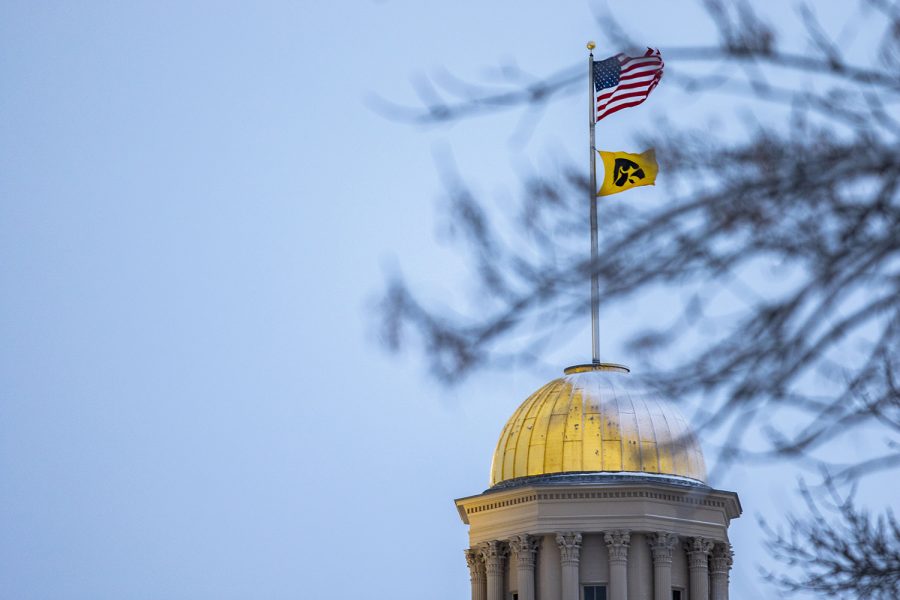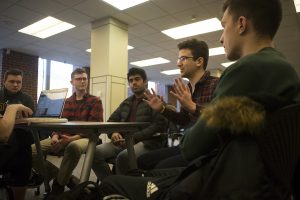Guest Opinion: Ousted professor’s free speech was violated
The American Association of University Professors write about how a former Kirkwood instructor was mistreated for his political views.
The Old Capitol is seen on Nov. 25, 2018.
September 10, 2019
The undersigned representatives of the American Association of University Professors in Iowa write to protest Kirkwood Community College’s treatment of Jeffrey Klinzman.
Because the state Board of Regents universities are partners with Kirkwood and the other community colleges in Iowa’s system of public higher education, sharing many students, academic projects, and important responsibilities to the people of Iowa, we have a strong interest in what happens at Kirkwood.
For more than a century, the AAUP has been acknowledged as the national repository of academic core values including academic due process. Its policies and procedures are the gold standard that guide the relationships between college and university governing boards, administrations, faculty, and students. These values also coincide with Iowans’ commitment to fairness and acting only after a diligent search for truth. In Klinzman’s case, neither Iowa values nor AAUP policies were honored by Kirkwood.
Very recently, Klinzman learned that two of his personal social-media posts prompted complaints to the Kirkwood administration. In the most recent post, Klinzman, a member of a local antifa (anti-fascist) group, responded angrily to President Trump’s angry denunciation of the antifa movement nationally. Apparently, some of the complaints also looked back to an old post from 2012 in which Klinzman quoted two lines from a poem written by Ilya Ehrenberg, a Russian anti-fascist of the World War II era, as part of his expression of disapproval of the Christian Right. Kirkwood does not claim that either post was made or quoted in the classroom, nor that either had any connection to Klinzman’s duties at Kirkwood.
Late in the week of Aug. 18, Klinzman was told that he could not continue to teach at Kirkwood and offered the choice of resignation or forced termination. Confronted with this choice, he resigned. Kirkwood’s reluctance to allow him back in the classroom seems to have stemmed from fear of violence from those complaining about his posts rather than from any fear that Klinzman might himself be violent.
We write that Kirkwood’s decision “seems” to have stemmed from fear of violence from the complainants because the events happened very quickly without any sort of formal investigation or opportunity for hearing. Klinzman was not notified of any sort of right to appeal or challenge the decision to terminate his employment with Kirkwood.
Personal social-media posts, and indeed any statements made outside the classroom and unrelated to professional duties, are considered “extramural statements” by AAUP — in other words, they’re not work-related. In a policy entitled “Statement on Extramural Utterances,” AAUP notes that a college or university administration may seek to discipline or discharge a faculty member “if it feels that … the professor’s extramural utterances raise grave doubts concerning the professor’s fitness for continuing service.” But the policy goes on to provide that “it is essential that the hearing should be conducted by an appropriate — preferably elected — faculty committee.
AAUP does not countenance discharge of a faculty member without the requisite fair procedures. Of course, Iowans expect that all public employees will receive fair procedure prior to discharge. AAUP policy also urges administrators to act deliberately rather than hastily in these situations; again, this emphasis on avoiding snap judgments coincides with our collective commitment to reasoned decision-making.
— Lois Cox, Chair, Committee A, AAUP UI Chapter
— Heimir Geirsson, Chair, Iowa State Conference of AAUP Committee A
— Loren Glass, President. AAUP UI Chapter
— Mack Shelley, President, AAUP ISU Chapter
— Becky Hawbaker, President, AAUP UNI Chapter
— Nancy Reincke, President, Iowa State Conference of AAUP





